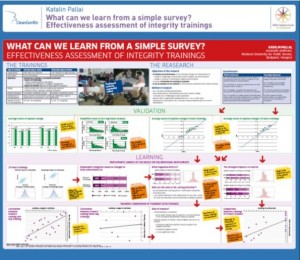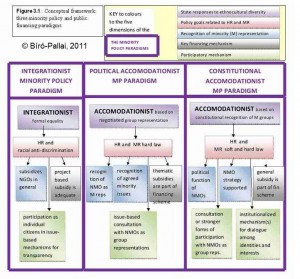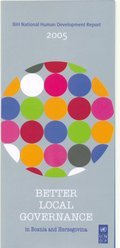 Effectiveness evaluation of public integrity trainings, 2013-15
Effectiveness evaluation of public integrity trainings, 2013-15
In 2013-14 in Hungary I conducted an effectiveness assessment survey a large public ethics and integrity training program that examined the knowledge and attitude change of 7,362 participants with the use of pre- and post-training questionnaires. The aim of the survey was to validate the training method and curriculum, collect information for the training providers on how to improve effectiveness of the trainings, and to demonstrate that even with a simple method, applicable even with weak organizational capacities, information can be produced both for validation and for further development of the curriculum. The research proved that the trainings had statistically significant learning impacts on participants both on knowledge and attitude level. The results also indicated that the effectiveness survey brings different results regarding both the learning impact and the ranking of trainers than the widely used satisfaction and reaction surveys. OECD Integrity-Forum- Katalin-Pallai EGPA paperafter conference
Impact of culture on the results of a tender for faculty for a post-graduate education program: the role of sense making, expectations and networks of potential teachers. 2015
The research examined a public tender process implemented in a context where process abuses are widely documented, but implementers of the examined tender aimed to initiate an honest process, The question was whether credible integrity of the tenderer can break the abusive culture and make tender an effective means to find the best people. The research examined the results of the tender and the opinions of potential and selected faculty. The result was that even when all countervailing forces to a decent tendering process couldn’t be eliminated, a prior argumentative process targeting stakeholders’ values, interpretations and expectations could impact actors’ strategies. The importance of the result lies in the fact that this seemingly simple solution is unfortunately rarely applied in the public administration in the region. IASIA 2015 Conference Pallai paper
Action reseach o the role of integrity advisors in Hungary, 2013-14
Within the research program of the Centre for Excellence in Integrity an action research was launched that used the deep knowledge and organizational intelligence of alumni form Integrity management courses in identifying adequate development strategies for the inclusion of the work of integrity advisers in public organizations. The action research aimed at identifying widely experienced integrity deficits and viable response strategies in cooperation with the alumni.
Public participation in multi-ethnic local governments
Research and course manual writing. LGI/Open Society Institute, 2011
In jurisdictions where different ethnic groups share a place where they live, and the conceptualization of some local affairs is differentiated along ethnic lines participation of stakeholders in the policy process is essential to building sustainable and just local societies. The manual discusses how public participation can be de-signed and managed in multi-ethnic contexts in a manner that it can support the implementation of the policy goals set by the local political community. The manual presents the key terms and concepts and the most important body of practical knowledge on local public participation, and examines the specific consequences of the multi-ethnic environment on the design and implementation of participatory mechanisms.
 Analysis of the distribution of public financial support for national minority associations
Analysis of the distribution of public financial support for national minority associations
Expert for the Council of Europe DH-MIn., 2010
Analysis of the distribution of public financial support (subsidies) for national minority associations prepared for the Committee of Experts on Issues Relating to the Protection of National Minorities of the Council of Europe. The analysis was ex-ecuted on the basis of a questionnaire filled up by 22 countries. On the basis of the information presented by the countries it analyzed actual financing schemes and the underlying approaches. The paper also discusses what kind of impacts the given financial arrangements can exercise to the self representation and identity preservation/building of the national minorities.
Spatial Analysis in Addressing Vulnerable groups
Mentor of research fellows for LGI, Hungary with CEE and SEE regional outreach, 2006-2009
 The purpose of the LGI Fellowship program is to conduct policy research aimed at stimulating innovative and practical policy reform. As Mentor Ms. Pallai supports talented policy experts from the CEE and SEE region. Fellows study the spatial clustering of vulnerable groups, public services and various opportunities for improving life conditions of these groups. Based on the analysis of local policies and the misfits of needs and opportunities, fellows, with the support of the mentor, elaborate practical policy recommendations for local authorities with regard to intervention strategies to address pockets of vulnerable groups.
The purpose of the LGI Fellowship program is to conduct policy research aimed at stimulating innovative and practical policy reform. As Mentor Ms. Pallai supports talented policy experts from the CEE and SEE region. Fellows study the spatial clustering of vulnerable groups, public services and various opportunities for improving life conditions of these groups. Based on the analysis of local policies and the misfits of needs and opportunities, fellows, with the support of the mentor, elaborate practical policy recommendations for local authorities with regard to intervention strategies to address pockets of vulnerable groups.
Localizing Sustainable Development
Evaluator for UNDP, Various countries, 2005
A more than two years long mega-project on more than 1,5 million USD budget that assisted local governments in eight post-communist countries to develop local strategies. The evaluation was conducted after the project ended and it had to evaluate results and propose potential follow up activities.
 National Human Development Report on Local Governance for Bosnia and Herzegovina
National Human Development Report on Local Governance for Bosnia and Herzegovina
Team leader for UNDP, BiH, 2004-2005
The publication of the NHDR on Local Governance produced the first systematic analysis of the condition and prospects of decentralization in BiH. Its publication coincided with Public Administration and Municipal Reform in BiH that gave a special importance for this review and the policy inputs it provided. Ms Pallai’s role was to lead the team of local experts and to lead wide consultation with decision makers at various levels of governments and with other stakeholders and on the basis of results to elaborate the final form of the report. The document was aimed to impact the work of parliamentary committees, legislators and local decision makers, and equally to influence public debate on decentralization. Its result were expected to offer a conceptual basis for further legislative drafting on local governance.
